人教版PEP小学英语五年级下册
PEP人教版小学五年级英语下册单词

PEP五年级下册四会单词词汇表Unit 1do morning exercises(晨练)eat breakfast(吃早饭)have english class(上英语课)play sports(进行体育运动)eat dinner(吃晚饭)when(什么时候)evening(夜晚;晚上)get up(起床)at(在……点钟)usually(通常;一般)noon(中午)climb mountains(爬山)go shopping(购物;买东西)play the piano(弹钢琴)visit grandparents(看望祖父母)go hiking(去远足)weekend(周末) often(经常)sometimes(有时候)Unit 2spring(春天)summer(夏天)fall(秋天)winter(冬天)season季节) which(哪一个)best(最;极) swim(游泳)fly kites(放风筝)skate(滑冰;滑冰鞋)make a snowman(堆雪人)plant trees(种树) why(为什么)because(因为) sleep(睡觉)Unit 3Jan./January(一月)Feb。
/February(二月)Mar。
/March(三月) Apr./April(四月)May(五月) June(六月) July(七月) Aug。
/Augest(八月) Sept。
/September(九月)Oct./October(十月) Nov。
/November(十一月) Dec。
/December(十二月)birthday(生日)uncle (叔叔;舅舅)her(她的)date(日期)Unit 4draw pictures(画画)cook dinner(做饭) read a book(看书)answer the phone(接电话)mom(妈妈)listen to music9(听音乐)clean the room(打扫房间)write a letter(写信)write an e—mail(写电子邮件)grandpa(爷爷;外公)study(书房)Unit 5fly(飞)jump(跳)walk(走) run(跑) swim(游泳)kangaroo(袋鼠)sleep(睡觉) climb(往上爬)fight(打架)swing(荡;荡秋千) drink water(喝水)Unit 6take pictures(照相)watch insects(观察昆虫)pick up leaves(采摘树叶)do an experiment(做实验)catch butterfly(捉蝴蝶)honey(蜂蜜)count insects(数昆虫)collect leaves(收集树叶)wtite a report(写报告)play chess(下棋)have a picnic(举行野餐)Unit 1do morning exercises(晨练) eat breakfast(吃早饭)have english class(上英语课)play sports(进行体育运动)eat dinner(吃晚饭)when(什么时候)evening(夜晚;晚上) get up(起床)at(在……点钟)usually(通常;一般)noon(中午)climb mountains(爬山)go shopping(购物;买东西)play the piano(弹钢琴)visit grandparents(看望祖父母)go hiking(去远足)weekend(周末)often(经常)sometimes(有时候)Unit 2spring(春天)summer(夏天)fall(秋天)winter(冬天)season季节)which(哪一个)best(最;极)swim(游泳)fly kites(放风筝)skate(滑冰;滑冰鞋) make a snowman(堆雪人)plant trees(种树) why(为什么) because(因为)sleep(睡觉)Unit 3Jan。
(完整版)人教版PEP小学英语五年级下册单词带音标

人教版PEP小学英语五年级下册单词带音标Unit 1do morning exercises 晨练['mɔ:niŋ] ['eksəsaiz]eat breakfast吃早饭[i:t] ['brekfəst] have English class上英语课[hæv] ['iŋgliʃ] [klɑ:s]play sports进行体育运动[plei][spɔ:ts] eat dinne r 吃晚饭['dinə]when 什么时候[(h)wen] evening夜晚;晚上['i:vniŋ]get up起床[get][ʌp]usually 通常;一般['ju:ʒʊəli] noon中午[nu:n]climb mountains爬山[klaim] ['mauntins]go shopping购物;买东西[gəu] ['ʃɔpiŋ]play the piano弹钢琴[plei] [pi'ɑ:nəu]visit grandparents看望祖父母['vizit] ['græn,pєərənts]go hiking去远足['haikiŋ]weekend周末['wi:kend]often经常['ɔ:ftən]sometimes有时候['sʌmtaimz]Unit 2spring 春天[spriŋ]summer夏天['sʌmə]fall 秋天[fɔ:l]winter 冬天['wintə]season 季节['si:zn]which哪一个[(h)witʃ]best 最;极[best]swim游泳[swim]fly kites放风筝[flai][kait]skate 滑冰(鞋)[skeit]make a snowman 堆雪人['snəʊmæn] plant trees种树[plɑ:nt][tri:s] because因为[bi'kɔz] sleep 睡觉[sli:p]Unit 3Jan./January一月[ 'dʒænjuəriFeb./Februar y二月['februəri] Mar./March 三月[ mɑ:tʃ]Apr./April四月['eiprəl]May 五月[mei]June 六月[ dʒu:n ]July 七月[dʒu'laɪ] Aug./August 八月【'ɔ:gəst】Sept./September九月[səp'tembə] Oct./October 十月[ ɔk'təubə ] Nov./November十一月[nəu'vembə] Dec./December十二月[di'sembə] birthday生日['bə:θdei]uncle叔叔;舅舅['ʌŋk l]her她的[hɝ]date日期[deit]Unit 4draw pictures画画[drɔ:]['piktʃəz] cook dinner做饭[kuk]['dinə] read a book看书[rid]answer the phone接电话['ɑ:nsə] [fəun]listen to music听音乐['lisn] ['mju:zik]clean the room打扫房间[kli:n][rum] write a letter写信[rait]['letə]write an e-mail 写电子邮件mom妈妈[mɔm]grandpa 爷爷;外公['grændpɑ:]study 书房['stʌdi]Unit 5fly飞[flai]jump跳[dʒʌmp]walk 走[wɔ:k]run跑[rʌn]swim 游泳[swim]kangaroo袋鼠[,kæŋgə'ru:] sleep睡觉[sli:p]climb往上爬[klaim]fight打架[fait]swing 荡;荡秋千[swiŋ]drink water喝水[driŋk]['wɔ:tə]Unit 6take pictures照相[teik]['piktʃəz] watch insects 观察昆虫[wɔtʃ]['insekt] pick up leaves 采摘树叶[pik][ʌp] [li:vz]do an experiment[du:][æn] [iks'perimənt]做实验catch butterfly 捉蝴蝶[kætʃ] ['bʌtəflai]honey蜂蜜['hʌni]count insects数昆虫[kaʊnt] ['insekt]collect leaves 收集树叶[kə'lekt]write a report写报告[rait][ri'pɔ:t]play chess下棋[plei][tʃes]have a picnic举行野餐['piknik]希望对家长,老师们辅导学生有帮助,祝愿同学们取得优异成绩。
Unit2Myfavouriteseason(单元解读)五年级英语下册(人教PEP版)

五下Unit 2 My favourite season 单元解读一、单元信息二.单元内容分析三、单元教学内容本单元来自PEP 小学英语五年级下册第二单元,主要围绕话题My favourite season 展开A、B、C 三个板块的教学。
梳理各课时语篇之间的延申与递进,话题之间的内在逻辑关联。
语篇一: 基于Part A Let's talk & Part A Let's learn。
该部分的核心内容是: Koala 来到中国访学,认识了Mike 等很多的新朋友,参观了他们的学校。
在相互了解的过程中,大家交流讨论了各自最爱的季节,并结合四季中各自不同的气候变化特征来说说为什么喜欢这个季节的原因。
通过第一节课初步的谈论,让孩子们了解四季的不同气候变化,感受每一个季节的典型特征与独特魅力,并学会正确表达和分享自己对各个季节的喜好。
语篇二: 基于Let's spell 。
该部分的核心内容是: 教师根据单元整体教学内容设计故事情境: Koala 米到中国访学,认识了很多的新朋友,他参观了朋友们的学校,受邀去斌斌家里做客,并和Zoom、Zip 一起度过特别的圣诞节。
现在,他又开心地和朋友们一起上课,发挥自己的特长,帮助孩子们学习英语语音。
本课以Koalas spelling class 为话题内容展开教学,学习br& gr 的自然拼读、发音规律以及应用。
通过本课的学习,帮助孩子们提升英语素养,借助英语这一语言工具,把中国的文化传统推广给世界更多的人,实现文化交流,展现文化自信。
语篇三: 基于Part B Let's talk & Part B Let's learn。
该部分的核心内容是: Koala 参观和欣赏朋友们的季节主题画展。
通过作品的呈现来了解朋友们对四季的不同点好,并结合四季中可以进行的一些典型而有代表性的活动来延申话题内容,从不同维度表达自己喜爱某个季节以及喜欢的原因。
小学英语人教版PEP五年级下册1-6单元知识点总结

Unit1 My day一、基本句型1.询问什么时候做某事:- When do you ……?你什么时候……?- I usually…at …. 我通常在…(点钟)…。
例:-When do you eat breakfast?-I eat breakfast at 7:00.2.What do you do on the weekend?你周末做什么?- I +频率副词+周末活动+时间。
或Sometimes I+周末活动例句:I sometimes go shopping with my mum on the weekend.(周末我时候和妈妈一起去购物)二、知识点:1.频率副词:always(总是,一直)>usually(通常)>often(经常)>sometimes(有时)2.只有Sometimes可以放在句首。
(Sometimes I cook dinner.)3.On the weekend 在周末on Saturdays 在周六on Sundays在周日(别忘加s)Unit2 My favourite season1.-Which season do you like best? (你最喜欢哪个季节?)Why?(为什么)-I like +季节+ best.(I like spring∕summer∕fall∕winter best) Because ___________.(因为)或:-What‘s your favourite season? -My favourite season is spring∕summer∕fall∕winter.2.-Why do you like winter best?(你为什么最喜欢冬天?) -Because______.二、知识点:1.leaf(树叶):复数leaves2.W,W真神奇,问出许多大问题。
what,what,问“什么”,when,when,问“时间”,where,where,问“哪里”,which,which,“哪一个”,why,why,“为什么”.Unit3 My school calendar补充:1.Dragon Boat Festival 龙舟节或端午节(农历五月五日)一般在阳历6月2.月份首字母大写。
人教版pep小学英语五年级下册单词表(带有音标)
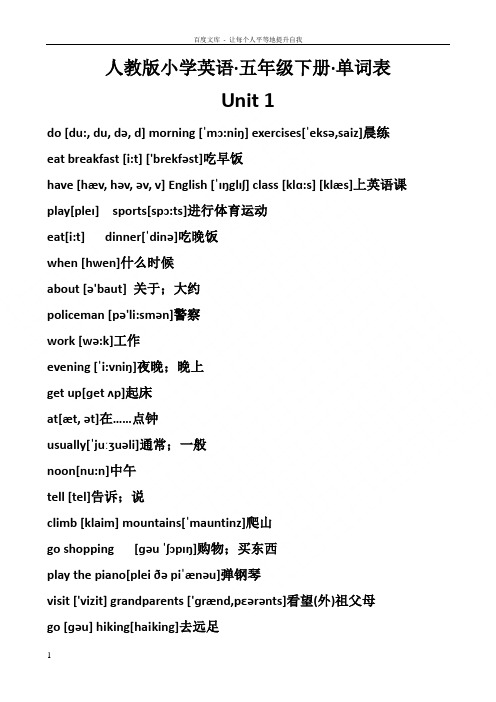
人教版小学英语·五年级下册·单词表Unit 1do [du:, du, də, d] morning [ˈmɔ:niŋ] exercises[ˈeksə,saiz]晨练eat breakfast [i:t] ['brekfəst]吃早饭have [hæv, həv, əv, v] English [ˈɪŋglɪʃ] class [klɑ:s] [klæs]上英语课play[pleɪ] sports[spɔ:ts]进行体育运动eat[i:t] dinner[ˈdinə]吃晚饭when [hwen]什么时候about [ə'baut] 关于;大约policeman [pə'li:smən]警察work [wə:k]工作evening [ˈi:vniŋ]夜晚;晚上get up[ɡet ʌp]起床at[æt, ət]在……点钟usually[ˈjuːʒuəli]通常;一般noon[nu:n]中午tell [tel]告诉;说climb [klaim] mountains[ˈmauntinz]爬山go shopping [ɡəu ˈʃɔpɪŋ]购物;买东西play the piano[plei ðəpiˈænəu]弹钢琴visit ['vizit] grandparents ['ɡrænd,pεərənt s]看望(外)祖父母go [ɡəu] hiking[haiking]去远足weekend[,wi:k'end, 'wi:kend]周末often['ɔfən, 'ɔftən, 'ɔ:-]经常sometimes['sʌmtaimz]有时候rain [rein]下雨either['aiðə, 'i:-] 也next[nekst] 下一个Unit 2 spring[spriŋ]春天summer['sʌmə]夏天fall[fɔ:l]秋天winter['wintə]冬天season['si:zən](季节which[hwitʃ]哪一个best[best]最;极always['ɔ:lweiz, -wiz] 总是play with [plei wið]玩…snow [snəu]雪leaf[li:f]复数leaves[li:vz]叶子up[ʌp] 至;朝向north [nɔ:θ]北方;向北方Halloween [ˌhæləʊˈi:n]万圣节之前夕Thanksgiving[θæŋksˈgɪvɪŋ]感恩节swim [swim]游泳fly [flai]kites[kaits]放风筝skate [skeit]滑冰;滑冰鞋make a snowman [meik əˈsnəʊˌmæn]堆雪人plant [plɑ:nt, plænt] trees [tri:z]种树why[hwaɪ, waɪ]为什么because [bɪˈkɔz, -ˈkʌz]因为sleep [sli:p]睡觉Unit 3Jan./January[英] [ˈdʒænjuəri] [美] [ˈdʒænjuˌɛri]一月Feb./February [英] [ˈfebruəri] [美] [ˈfɛbruˌɛri, ˈfɛbju-]二月Mar./March [mɑ:tʃ]三月Apr./April ['eiprəl]四月May [mei]五月June [dʒu:n]六月July [dʒʊˈlaɪ]七月Aug./August [ɔ:ˈɡʌst]八月Sept./September [sep'tembə]九月Oct./October[ɔk'təubə]十月Nov./November[nəu'vembə]十一月Dec./December[di'sembə]十二月chart [英] [tʃɑ:t] [美] [tʃɑrt]图表birthday['bə:θdei]生日uncle['ʌŋkl]叔叔;舅舅cousin['kʌzn] 堂表兄弟;堂表姐妹first [fə:st]第一second['sekənd] 第二third[θə:d] 第三forth [英] [fɔ:θ] [美] [fɔrθ, forθ]第四fifth[fifθ] 第五eighth [eitθ, eiθ]第八ninth [nainθ]第九twelfth[twelfθ] 第十二twentieth['twentiiθ] 第二十send[send] 寄;发送e [i:] -card [英] [kɑ:d] [美] [kɑrd电子卡片her [hə:]她的able [ˈeibl]能everybody [ˈevribɔdi]每个人then [ðen] 那么date [deit]日期Unit 4 draw [drɔ:] pictures ['piktʃəz]画画cook [kuk] dinner ['dinə]做饭read a book [ri:d ə buk]看书answer ['ɑ:nsə, 'æn-] the phone[fəun]接电话talk [tɔ:k] 讲话Children’s[ˈtʃɪldrənz] Center[ˈsentə] 儿童活动中心see [si:] you [ju:, ju, jə] later [ˈleitə] 再见listen ['lisən] to music ['mju:zik]听音乐clean [kli:n] the room [ru:m, rum]打扫房间write [rait] a letter ['letə]写信write an e-mail [ˈi:meil]写电子邮件mom [英] [mɔm] [美] [mɑm]妈妈grandpa ['ɡrændpɑ:]爷爷;外公speak [spi:k] to[tu:,tu,tə] 和…讲话hold on [həuld ɔn] 等一下call[kɔ:l] 打电话study['stʌdi]书房Unit 5fly[flai]飞jump[dʒʌmp]跳walk[wɔ:k]走run[rʌn]跑swim[swim]游泳kangaroo[ˌkæŋgəˈru:]袋鼠trunk [trʌŋk]象鼻sleep[sli:p]睡觉climb[klaim]往上爬fight[fait]打架swing[s wiŋ]荡;荡秋千drink[driŋk] water['wɔ:tə, 'wɔ-]喝水climber['klaimə] 攀登者Unit 6 take pictures[teik ˈpiktʃəz]照相watch[wɔtʃ, wɔ:tʃ] insects['insekts]观察昆虫pick[pik] up [ʌp] leaves[li:vz]采摘树叶do an experiment[du: æn iksˈperimənt]做实验catch [kætʃ] butterflies['bʌtəflaiz]捉蝴蝶woods [wudz] 树木ant [ænt] 蚂蚁interesting [ˈɪntrɪstɪŋ,ˈɪntrəstɪŋ] 有趣的have a look [hæv ə luk] 看一看honey ['hʌni]蜂蜜thing [θiŋ] 东西;物count [kaunt] insects ['insekts]数昆虫collect [kə'lekt] leaves [li:vz]收集树叶write [rait] a report [ri'pɔ:t]写报告play chess[plei tʃes]下棋have a picnic [hæv əˈpiknik]举行野餐him [him, ɪm]他宾格leave [li:v]离开us [ʌs,əs, s]我们宾格over there [ˈəuvə ðɛə]在那边。
(完整版)小学英语人教PEP五年级下册新版(课文+单词表)
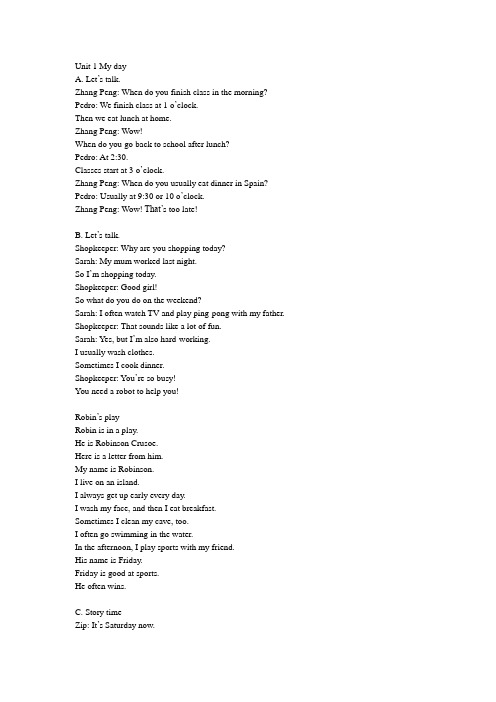
Unit 1 My dayA. Let’s talk.Zhang Peng: When do you finish class in the morning? Pedro: We finish class at 1 o’clock.Then we eat lunch at home.Zhang Peng: Wow!When do you go back to school after lunch?Pedro: At 2:30.Classes start at 3 o’clock.Zhang Peng: When do you usually eat dinner in Spain? Pedro: Usually at 9:30 or 10 o’clock.Zhang Peng: Wow! That’s too late!B. Let’s talk.Shopkeeper: Why are you shopping today?Sarah: My mum worked last night.So I’m shopping today.Shopkeeper: Good girl!So what do you do on the weekend?Sarah: I often watch TV and play ping-pong with my father. Shopkeeper: That sounds like a lot of fun.Sarah: Yes, but I’m also hard-working.I usually wash clothes.Sometimes I cook dinner.Shopkeeper: You’re so busy!You need a robot to help you!Robin’s playRobin is in a play.He is Robinson Crusoe.Here is a letter from him.My name is Robinson.I live on an island.I always get up early every day.I wash my face, and then I eat breakfast.Sometimes I clean my cave, too.I often go swimming in the water.In the afternoon, I play sports with my friend.His name is Friday.Friday is good at sports.He often wins.C. Story timeZip: It’s Saturday now.Zoom, I’m always very busy.Zoom: Why?Zip: Let me see.From Monday to Wednesday, I usually collect nuts in the afternoon. Zoom: What else?Zip: On Thursday, I often dry my nuts in the sun.Zip: On Friday, I eat nuts with my friends.Zoom: What do you usually do on the weekend?Zip: I often watch TV, but this weekend I have a show.I’ll play the pipa.Zoom: When?Zip: Saturday, at 12 o’clock.Oh, no!Words in unit 1eat breakfast 吃早饭have … class上……课play sports 进行体育运动exercise 活动;运动do morning exercises 早锻炼eat dinner 吃晚饭clean my room 打扫我的房间go for a walk 散步go shopping 去买东西;购物take 学习;上(课)dancing 跳舞;舞蹈take a dancing class 上舞蹈课when 什么时候;何时after 在(时间)后start 开始usually 通常地;惯常地Spain西班牙late晚;迟a.m. 午前;上午p.m. 午后;下午why 为什么shop 去买东西;购物work 工作last 上一个的;刚过去的sound 听起来好像also 还;也busy忙的need 需要play 戏剧;剧本letter 信for 表示接受某事物的人live 居住island 岛always 总是,一直cave 山洞;洞穴go swimming 去游泳win 获胜Unit 2 My favourite seasonA. Let’s talkMr Jones: Do you like the music, children?Mike: Yes. It’s very beautiful.What is it?Mr Jones: The Four Seasons.Today we’ll draw the seasons.Which season do you like best, Mike?Mike: Winter. I like snow.Mr Jones: I like snow, too.Which season do you like best, Wu Yifan?Wu Yifan: Spring. It’s pretty.Mr Jones: Yes, it is.B. Let’s talkAmy: Hello, Miss White.Look at my picture.Miss White: Good job!I like the trees.The colours are very pretty.Amy: Yes. I like autumn best.The weather is good and the colours are beautiful!Which season do you like beat, Miss White?Miss White: Summer.Amy: Why?Miss White: Because I like summer vacation!Robin likes them all!Look at the green trees and pink flowers.I like spring because there are beautiful flowers everywhere. The weather is hot, hot, hot!I like summer, but I can’t swim.What lovely colours!The leaves fall and fall and fall.I love fall!Wow! I want to paint a picture, too!There is lots of snow.It is white everywhere.I like winter because I can play in the snow.Story timeZip &Zoom: Welcome!Koala: Thank you. Merry Christmas!Zip &Zoom: Merry Christmas!Zoom: What do you usually do on Christmas Day?Koala: I usually go to the beach and swim in the sea!Zoom: You swim in winter?Koala: Christmas is in summer in Australia, so we never have snow for Christmas. Zoom: Which season do you like best?Koala: Summer. I like sunny days.Koala: Wow! A white Christmas!Zoom: Let’s make a snowman.Zip &Koala: Great!Zip: Say “cheese”!Koala: Cheese!Words in unit 2spring 春天summer 夏天autumn 秋天winter 冬天season 季节picnic 野餐go on a picnic 去野餐pick 摘;采集pick apples 摘苹果snowman 雪人make a snowman 堆雪人go swimming 去游泳which 哪一个best 最好地snow 雪good job做得好because 因为vacation 假期all 全,完全pink 粉色;粉色的lovely 可爱的;美丽的leaf 叶子fall 落下;【美】秋天paint 用颜料绘画Unit 3 My school calendarA – Let’s talk.Mike: We have a few fun things in spring. After the sports meet, we have an Easter party. Zhang Peng: When is the party?Mike: It’s in April.We have a school trip, too.Zhang Peng: When is that?Mike: It’s in May.Zhang Peng: Cool!B – Let’s talk.Oliver: Autumn is my favourite season.I really like the colours.Chen Jie: I like autumn, too.We usually have a school trip in autumn. Oliver: Great!When is the trip this year?Chen Jie: It’s in October.We’ll go to the Great Wall.Oliver: Cool!I love the Great Wall!B – Easter PartyWHEN: April 12th, 7 p.m.WHY: Easter holidayWHERE: Wu Yifan’s homeWHAT: We will play many games.We will roll Easter eggs.We will look for eggs.We will eat chocolate eggs.You will meet the Easter Bunny!RSVP: Will you come to the party?Please send me an email by March 23rd. Robin@.C – Story timeZoom: Look at my summer vacation plan! Zip: It’s April now.The summer vacation is still three months away. Zoom: Early planning is always good.Zoom: In July I’ll visit my grandparents.They live in Xinjiang.Zip: What will you do there?Zoom: We’ll go to the Grape Valley.The grapes there are very sweet!Grapes are my favourite fruit!Zoom: In August, I’ll go to Huangshan Moutain.The trees there are very famous.The clouds are beautiful.Zip: Sounds great!Zip: You have a great plan, but what will you do this weekend? Zoom: This weekend?Zip: There is a maths test next Monday.So please study hard.Zoom: Oh my! I forgot!Words in unit 3January 一月February 二月March 三月April 四月May 五月June 六月July 七月August 八月September 九月October 十月November 十一月December 十二月plant 种植contest 比赛;竞赛year 年few 一些a few 一些thing 事情meet 集会;开会sports meet运动会Easter 复活节trip 旅行national 国家的National Day 国庆日American 美国的Thanksgiving 感恩节Christmas 圣诞节Great Wall 长城holiday 假日;节日game 游戏roll 滚动look for 寻找chocolate 巧克力bunny (用作儿语)兔子RSVP(尤用于请柬)请赐复by 在……之前Recycle 1-1Sarah will visit Sydney in April.She asks Stella, a friend there, about the weather.Here is Stella’s reply.Hi, Sarah!It is autumn in April here in Sydney.Autumn is my favourite season!It is warm in the day and cool at night.Many people visit us in autumn because they like the weather. When you come, you can visit the Sydney Royal Easter Show. It is the largesse event in Australia.What is the weather like in April in you city?What do you often do?All best,StellaRecycle 1-2Sarah often reads to Sam.This is a poem that Sarah will read today.Bed in SummerBy Robert Louis StevensonIn winter I get up at nightAnd dress by yellow candlelight.In summer, quite the other way,I have to go bed by day.I have to go to bed and seeThe birds still hopping on the tree,Or hear the grown-up people’s feetStill going past me in the street.And does it seem hard to you,When all the sky is clear and blue,And I should like so much to play.To have to go to bed by day?Unit 4 When is Easter?A – Let’s talk.Mr Jones: There are some special days in April.Zhang Peng: What are they?Mr Jones: April Fool’s Day and Easter.Zhang Peng: When is April Fool’s Day?Mr Jones: It’s on April 1st.Zhang Peng: And Easter?Mr Jones: It’s on April 5th this year.Zhang Peng: Wow! I love April.B—Let’s talkChen Jie: When is your birthday?Mike: My birthday is on April 4th.Chen Jie: That’s my mother’s birthday, too!Mike: Cool! What will you do your mum?Chen Jie: I’ll cook noodles for her.Mike: Chinese noodles are delicious!Chen Jie: Please come then. We can have a birthday party for both of you!Two new kittensSarah’s cat has two kittens.Read Sarah’s diary.April 15thMy cat has two new kittens.They are pink, because they are very young.They still can’t see.April 21stThe kittens are six days old.They make noises when they are hungry.They have white fur now.They are cute.April 26thTheir eyes are open!They are blue.May 3rdThe kittens can walk now.They can play with Robin!C—Story timeApril 30thMusic teacher: The singing test will be on May 4th.Zoom: I can’t sing well.Zip: Don’t worry.Practice makes perfect.May 1stZip: Will you come to the party?Today is Rabbit’s birthday.Zoom: Sorry, I can’t.I want to practise my song.May 2ndRabbit: Will you play football with me after school? Zoom: Sorry, I can’t.I want to practise the song.May 3rdCat: Let’s watch TV together.Zoom: Sorry. I need more practice.May 4thMusic teacher: Good job, Zoom.Zoom: Thank you, Miss Bird.Cat: I’ll go swimming tonight.Will you go?Zoom: Of course!Words in unit 4first (1st)第一的second (2nd)第二的third (3rd)第三的fourth (4th)第四的fifth (5th)第五的twelfth (12th)第十二的twentieth (20th)第二十的twenty-first (21st)第二十一的twenty-third (23rd)第二十三的thirtieth (30th)第三十的fool 蠢人;傻瓜special 特别的;特殊的kitten 小猫diary 日记still 仍然;依旧;还是noise 声音;响声(尤指)噪音fur (某些动物的)浓密的软毛open 开着的walk 行走Unit 5 Whose dog is it?A—Let’s talkChen Jie: The yellow picture is mine.Are these all ours?Mike: Yes, they are.Chen Jie: Wow! That picture of Beijing is beautiful. Whose is it?Mike: It’s Zhang Peng’s.Chen Jie: Look! There is a picture of Shanghai, too.Mike: It’s Yifan’s.Chen Jie: Oh, yes! It’s his.B—Let’s talk(Sam is at Chen Jie’s home.)Sam: Where is Fido now?Chen Jie: He’s in the kitchen.Sam: Is he drinking water?Chen Jie: No, he isn’t.He’s eating.Sam: Can I play with him now?Chen Jie: Yes. Can you take him to the park? Sam: Woof, woof!Robin at the zooSarah and Robin are at the zoo.Robin is excited!I’m looking at a bear.I’m dancing like a bear.I’m looking at the rabbits.I’m eating like a rabbit.I’m looking at a tiger.I’m running like a tiger.I’m looking at an elephant.I’m walking like an elephant.I’m looking at a monkey.I’m climbing like him.I’m looking at a bird.I like flying.I want to be a bird.Robin, do you want to swim like a fish?No! No! I don’t want to be a fish!C—Story timeZip: Here comes a tiger.Zoom: Where is it?Zip: Shh. Be quiet.Zoom: Ah-choo!Zip: Whose tail is that?It’s running so fast.Zoom: Is it the tiger?Zip: Yes, it is.Zip: I see two monkeys.Zoom: Where are they?Zip: Shh. They’re climbing.Zoom: Wow! They’re fast, too.Zoom: What are they doing?Zip: Why are they looking at us?Zoom: I don’t know.Zip: Look! They’re taking pictures, too.Zoom: That’s cute.They’re copying us!Words in unit 5mine 我的yours 你(们)的his 他的hers 她的theirs 他们的;她们的;它们的ours 我们的climbing (climb的-ing形式)(正在)攀登;攀爬eating(eat的-ing形式)(正在)吃playing(play的-ing形式)(正在)玩耍jumping(jump的-ing形式)(正在)跳drinking(drink的-ing形式)(正在)喝(水)sleeping(sleep的-ing形式)(正在)睡觉each 每一;各个other 其他的each other 相互excited 兴奋的;激动的like 像……那样Unit 6 Work quietly!A—Let’s talkChen Jie: Look at the pandas.Mike: What are they doing?Chen Jie: Haha. They’re eating lunch!They’re so cute.Mike: Oh, yes! They like bamboo.Chen Jie: What’s the little monkey doing?Mike: it’s playing with its mother!Chen Jie: Do you see any elephants?Mike: Yes! Look there!The elephant is drinking water.B—Let’s talkTom: My name is Tom.What’s your name?John: Shh. Talk quietly.I’m John.I can show you the English books. Tom: Thanks.John: Here they are.Tom: OK. Can I read the books here? John: Yes. Of course.Tom: Anything else?John: Yes. Keep your desk clean. Tom: OK, I will.Thanks.The world robot exhibitionNi hao. Ni zai gan shen me ne? Sorry. What are you saying?I’m speaking Chinese.Oh, hello.What are you doing?I’m drawing a picture.Have a look.It’s lovely.Are you cooking?Yes. I’m cooking rice.Asako is making sushi.Can we play music with you? Sure. Please take turns.Are you from China?Yes, I am.You’re so cool!Can you teach me?Sure!Are you doing kung fu?Yes, I am.I’ll show you.C—Story timeZip: I love the film.Zoom: Yes. The gorilla is great!Zip: Wow! The gorilla is eating bananas.Zoom: It’s so big and strong.Zip: What’s that noise?Zoom: I’m eating popcorn.Zip: It’s so exciting!Zoom: Yes, it is!Tiger: Shh! Talk quietly!Zoom: Sorry!Zip: Look at the sign.Zoom: Oh, no!Words in unit 6doing morning exercises(正在)早锻炼having … class(正在)上课eating lunch(正在)吃午饭reading a book(正在)看书listening to music(正在)听音乐keep保持某种状态keep to the right靠右keep your desk clean 保持你的课桌整洁talk quietly 小声讲话turn 顺序take turns 按顺序来bamboo 竹子its它的;他的(指事物、动物或幼儿)show 引导;指引anything 任何事物else 另外;其他exhibition 展览say 说;讲have a look 看一看sushi 寿司teach 教Canadian 加拿大的Spanish 西班牙的Recycle 2Thirty days has September, April, June and November; February has twenty-eight alone.All the rest have thirty-oneExcept in leap year.That’s the timeWhen February’s days are twenty-nine.。
人教版pep小学英语五年级下册单词表(带音标)

Unit 1eat breakfast吃早饭have …class上…课play sports 进行体育运动exercise[ˈeksəsaɪz] 活动;do morning exercises 做早操eat dinner吃晚饭clean my room 打扫我的房间go for a walk 散步go shopping 去买东西;购物take[teɪk] 学习;上(课)dancing ['dɑːnsɪŋ]跳舞;舞蹈take a dancing class课when [wen] 什么时候;何时after [ˈa:ftə(r)] 在(时间)后start [sta:t] 开始usually [ˈjuːʒuəli] 通常地;地Spain [speɪn] 西班牙late[leɪt] 晚;迟a.m. [ˌeɪˈem] 午前;上午p.m.[ˌpi:ˈem] 午后;下午why [waɪ] 为什么shop 去买东西;购物work [wɜ:k]工作last [la:st] 上一个的;刚过去的sound[saʊnd] 听起来好像also [ˈɔ:lsəu] 还;也busy['bɪzi]忙的need [ni:d]需要play[pleɪ] 戏剧;剧本letter[ˈǀe tə(r)] 信live [lɪv] 居住island [ˈaɪlənd]岛always ['ɔːlweɪz]总是;一直cave [keɪv] 山洞;洞穴go swimming 去游泳win [wɪn] 获胜Unit 2spring[sprɪŋ]春天summer['sʌmə(r)]夏天autumn['ɔːtəm]秋天winter['wɪntə]冬天season['si:zn]季节picnic['pɪknɪk]野餐go on a picnic 去野餐pick[pɪk]摘;采集pick apples 摘苹果snowman['snəʊmæn]雪人make a snowman 堆雪人go swimming 去游泳which [wɪtʃ] 哪一个best[best] 最;最高程度地snow [snəu]雪good job 做得好because[bɪ'kɒz]因为vacation[vəˈkeɪʃn] 假期all [ɔːl]全;完全pink [pɪŋk]粉色;粉色的lovely['lʌvli]可爱的;美丽的leaf[li:f] 叶子(复数leaves[li:vz] )fall [fɔːl]落下;(美)秋天paint [peɪnt]用颜料绘画Unit 3January[ˈdʒænjuəri]一月Jan.February [ˈfebruəri]二月Feb. March [mɑ:tʃ]三月Mar.April ['eɪprəl]四月Apr.May [meɪ]五月June [dʒu:n]六月July [dʒʊˈlaɪ]七月August [΄ɔ:ɡəst]八月Aug. September[sep'tembə(r)] Sept.October[ɒk'təubə(r)]十月Oct. November [nəu'vembə(r)]十一月Nov.December [di'sembə(r)]十二月Dec.few [fjuː]不多;很少a few 一些thing[θɪŋ]事情meet [miːt]集会;开会sports meet 运动会Easter [ʳi:stə(r)] 复活节trip [trɪp] 旅行year [jɪə(r)] 年plant [plɑːnt]种植contest ['kɒntest]赛the Great Wall 长城national ['næʃnəl] 国家的National Day 国庆日American [əˈmerɪkən] 美国的Thanksgiving [ˌθæŋks'gɪvɪŋ]感恩节Christmas [krɪsməs] 圣诞节holiday['hɒlədeɪ] 假日;节日game [geɪm] 游戏roll [rəʊl] 滚动look for 寻找chocolate ['tʃɒk(ə)lət]['tʃɑklət] ['tʃɒklət]巧克力bunny ['bʌni] (用作儿语)兔子RSVP (尤用于请柬)请赐复by [baɪ] 在……之前Unit 4first(1st)[fɜːst] 第一(的)second(2nd)['sek(ə)nd] 第二(的)third(3rd)[θɜːd] 第三(的)fourth (4th)[fɔːθ]第四(的)fifth (5th)[fɪfθ]第五(的)twelfth (12th)[twelfθ]第十二(的)twentieth (20th)[ˈtwentiəθ]第二十(的)twenty-first(21st)['twenti'fɜ:st] 第二十一(的)twenty-third (23rd)[,twenti'θə:d]第二十三(的)thirtieth(30th)['θɜːtɪəθ]第三十(的)special ['sp eʃl]的fool [fuːl] 蠢人;傻瓜kitten ['kɪtn] 小猫diary ['daɪəri] 日记still [stɪl]noise [nɔɪz] 声音;响声;噪音fur [fɜː(r)](某些动物的)软毛open ['əʊpən] 开着的walk [wɔːk] 行走Unit 5mine [maɪn] 我的yours [jɔːz] 你(们)的his [hɪz] 他的hers [hɜːz] 她的theirs [ðeəz]它们的ours [a:z;΄aʊəz]我们的climbing['klaɪmɪŋ](climb['klaɪm]的-ing形式(正在)攀登;攀爬eating ['iːtɪŋ](eat的-ing(正在)吃playing ['pleɪɪŋ](play的形式)(正在)玩耍jumping['dʒʌmpɪŋ](jump['dʒʌmp]的-ing形式(正在)跳drinking ['drɪŋkɪŋ](['drɪŋk]的-ing形式)喝(水)sleeping ['sliːpɪŋ](sleep ['sliːp]的-ing形式)(正在)睡觉each [iːtʃ] 每一;各个other['ʌðə(r)] 其他each other 相互excited [ɪk'saɪtɪd] 兴奋的;激动的like [laɪk] 像……那样Unit 6doing morning exercises(正在)做早操having…class (正在)上……课eating lunch (正在)吃午饭reading a book (正在)看书listening to musi(正在)听音乐keep [kiːp] 保持某种状态keep to the right 靠右keep your desk clean 保持你的课桌干净talk quietly 小声讲话turn [tɜːn] 顺序take turns 按顺序来bamboo [,bæm'buː] 竹子its [ɪts] (指事物、动物或幼儿)它的;他的;她的show [ʃəʊ] 给人看;指引anything ['en iθɪŋ]任何事物else[els] 另外;其他exhibition[,eksɪ'bɪʃn] 展览say [seɪ] 说;讲have a look 看一看sushi['suːʃi]寿司teach [tiːtʃ] 教sure [ʃʊə(r)] (表示同意)当然Canadian[kə'neɪd iən] 加拿大的Spanish['spænɪʃ] 西班牙的。
人教版PEP五年级英语下册第二单元《My favourite season》教案
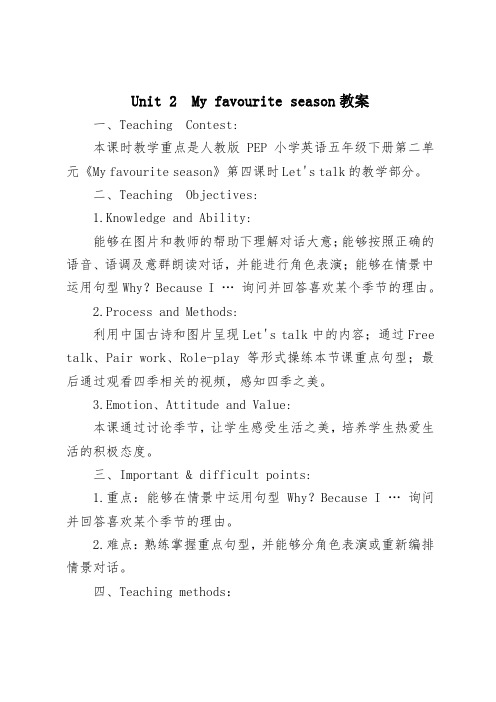
Unit 2 My favourite season教案一、Teaching Contest:本课时教学重点是人教版PEP小学英语五年级下册第二单元《My favourite season》第四课时Let's talk的教学部分。
二、Teaching Objectives:1.Knowledge and Ability:能够在图片和教师的帮助下理解对话大意;能够按照正确的语音、语调及意群朗读对话,并能进行角色表演;能够在情景中运用句型Why?Because I …询问并回答喜欢某个季节的理由。
2.Process and Methods:利用中国古诗和图片呈现Let's talk中的内容;通过Free talk、Pair work、Role-play等形式操练本节课重点句型;最后通过观看四季相关的视频,感知四季之美。
3.Emotion、Attitude and Value:本课通过讨论季节,让学生感受生活之美,培养学生热爱生活的积极态度。
三、Important & difficult points:1.重点:能够在情景中运用句型Why?Because I …询问并回答喜欢某个季节的理由。
2.难点:熟练掌握重点句型,并能够分角色表演或重新编排情景对话。
四、Teaching methods:Free talk、Pair work、Role-play等五、Teaching aids:关于四季季节的图片、诗句、音频和视频六、Teaching procedures:Step 1 Warm up1.--Good morning, class!Today, we'll learn Unit 2 My favourite season.Before the class,let's sing a song about season,OK?--OK...(Teacher&Students sing together.)--Wow,you are so great! Clap hands for yourself.2.Next Let's do a revision.--Which season do you like best?--Spring/Summer/...--Good job? And which season do you like best?--I like summer best.--I like summer, too.Step 2 Presentation and Practice1.Presentation:T:As we know, there are many poems about seasons in China. For example,《春晓》、《春夜喜雨》、《绝句》。
人教版PEP小学英语五年级下册unit1至unit3知识点归纳

五年级下册Unit 1-3重点难点、单元单词、短语和知识点知识梳理第一单元知识点一、主要单词:do morning exercises晨练,做早操 eat breakfast吃早饭 have English class上英语课 play sports进行体育活动 eat dinner吃晚饭 eat lunch 吃午饭 climb mountains爬山 go shopping购物,买东西 play the piano 弹钢琴 visit grandparents看望(外)祖父母 go hiking去远足二、主要句子:When do you eat dinner你什么时候吃晚饭I eat dinner at 7:00 in the evening.我晚上七点吃晚饭。
When do you get up你什么时候起床I usually get up at 12:00 at noon.我通常在中午12点起床。
What do you do on the weekend你在周末干什么Usually I watch TV and go shopping.我通常看电视和购物。
Sometimes I visit my grandparents.有时候我去看望我的外祖父母。
I often play football.我经常踢足球。
Sometimes I go hiking.有时候我去远足。
三、同义词eat breakfast—have breakfast eat lunch—have luncheat dinner—have dinner play sports—do sports usually—often复数形式:policeman—policemen policewoman—policewomen现在分词:tell—telling三单:say—says同义句:What do you do ---What are you你是干什么的四、表示频度的副词:always总是,一直 usually通常,常常 often经常 sometimes有时候五、以复数形式出现的词组:visit grandparents plant trees介词后跟表示时间的词语时,表示在某年、某月、某个季节,某个时候(在上午,在下午,在晚上)用in;表示在某一天,在星期几用on,在具体的几点几分用at.七、too 和either的用法区别:too和either都是“也”的意思,但too用于肯定句,either用于否定句。
人教版PEP小学英语五年级下册知识点汇总(最新)
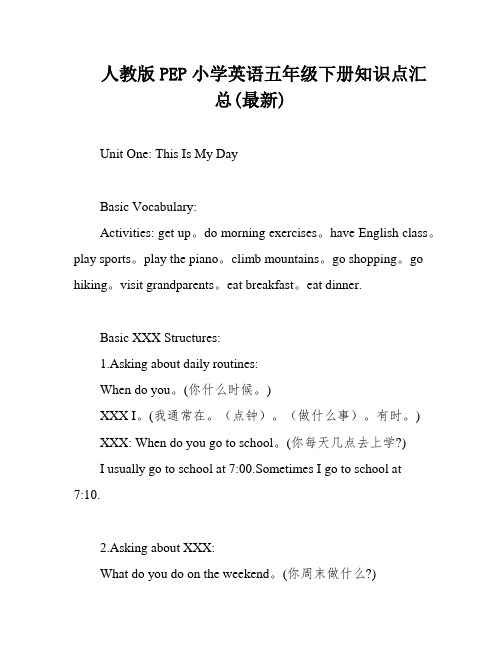
人教版PEP小学英语五年级下册知识点汇总(最新)Unit One: This Is My DayBasic Vocabulary:Activities: get up。
do morning exercises。
have English class。
play sports。
play the piano。
climb mountains。
go shopping。
go hiking。
visit grandparents。
eat breakfast。
eat dinner.Basic XXX Structures:1.Asking about daily routines:When do you。
(你什么时候。
)XXX I。
(我通常在。
(点钟)。
(做什么事)。
有时。
)XXX: When do you go to school。
(你每天几点去上学?)I usually go to school at 7:00.Sometimes I go to school at7:10.2.Asking about XXX:What do you do on the weekend。
(你周末做什么?)XXX I。
(我通常/经常。
有时。
)XXX: What do you do on the weekend?I often play XXX I go shopping with my mom.3.Introducing one's own habits:Every weekend。
I go hiking。
(我每个周末远足。
)Every day。
I do my homework at 8:00 in the evening。
(我每天晚上8点做作业。
)4.Asking XXX:What do you do。
(你是干什么的?)Time:morning。
afternoon。
evening。
noon。
at night。
6:00.on Sunday。
英语人教版pep五年级下册

英语人教版pep五年级下册
《PEP五年级英语》是中国人教版的教材,下册主要包括Unit
7到Unit 12的内容。
这些单元涵盖了日常生活中的各种主题,包
括家庭、食物、购物、假期等等。
每个单元都包括了听、说、读、
写等多种教学活动,旨在帮助学生全面提高英语能力。
在这个学习阶段,学生将学习如何描述家庭成员、谈论日常活动、购物、询问路线以及描述假期活动等。
教材内容丰富多彩,涵
盖了丰富的语法知识和词汇量,通过多种形式的练习和活动帮助学
生提高听、说、读、写的能力。
教材的设计注重培养学生的实际运用能力,通过与同学的互动、小组合作等方式,激发学生学习英语的兴趣,提高他们的学习积极性。
同时,教材注重培养学生的语言思维能力,帮助他们培养自主
学习的能力,为他们的英语学习打下坚实的基础。
总的来说,《PEP五年级英语》下册是一个很好的教材,它注
重培养学生的实际应用能力,通过丰富多彩的教学活动帮助学生全
面提高英语能力。
希望学生在使用这套教材的过程中能够对英语产
生浓厚的兴趣,从而更好地掌握英语知识。
人教版(PEP)小学英语五年级下册教案第四单元(精心汇编)

人教版(PEP)小学英语五年级下册教案第四单元Unit 4 What Are You Doing?●Topic:描述自己或他人正在做的事情。
●Language systems:1.Lexis: drawing pictures, doing the dishes, cooking dinner, reading a book,answering the phone, listening to music, washing the clothes, cleaning the room, writing a letter, writing an e-mail.Grammar: 现在进行时的句型。
2.function: 能够运用现在进行时询问他人在做什么和描述自己和他人正在做的事情。
3.phonology :字母组合oo ou tr tw的发音规则●Language skills:1.Listening:(1)能听懂AB部分Let’s learn的单词。
(2)能听懂别人运用现在进行时描述正在做的事情。
(3)能听懂AB部分Let’s talk中的对话。
2.speaking:(1)会说AB部分Let’s learn的单词。
(2)能用现在进行时描述自己或别人正在做的事情。
(3)能与别人谈论或询问对方正在做什么。
3.reading:(1)能认读本课AB部分的单词和句子。
(2)能读懂本课AB部分read and write中的对话,并独立完成练习。
(3)能读懂与本课内容有关的其他文章。
4.writing:(1)能正确拼写本课AB部分的单词和四会句子。
(2)会写几句话介绍自己或别人正在做的事情。
Objectives:1.能力目标(1)能够简单描述自己或他人正在做什么,如:I’m answering the phone.She’s cooking dinner.(2)能够询问他人正在做什么,如:What are you doing? What is he/she doing?(3)能够听懂,会唱歌曲“What Are You Doing?”.2.知识目标(1)能够听、说、读、写上会掌握A、B部分Let’s learn , Read and write 中的四会短语和句子。
PEP人教版小学英语五年级下册单词表(含音标)

sound
[saʊnd]
vi.听起来;发出声音n.声音
25
also
['ɔ:lsəu]
ad.也,同样;而且,还
26
busy
['bɪzɪ]
a.忙(碌)的
27
need
[ni:d]
n.需要,需求aux.&v.需要,必须
28
play
[pleɪ]
v.玩;打(球);游戏;播放(过去式:played)n.玩耍,戏剧
v.寻找
92
chocolate
['tʃɒklət]
n.巧克力
93
bunny
[ˈbʌni]
n.兔子;可爱的女郎
94
RSVP
[ˌɑ:resvi:'pi:]
abbr. Reply,if you please请回复
95
by
[baɪ]
prep.靠近,在…旁;在…时间;不迟于;被;用;由;乘(车
96
first
[fɜ:st]
num.第一a.&ad.第一;首次;最初n.开始;开端
97
second
['sekənd]
n.秒;第二(个);(月的)第二日num.第二adj.第二的
98
third
[θɜ:d]
num.第三n.第三(个);(月的)第三日adj.第三的
99
fourth
[fɔ:θ]
num.第四n.第四(个);(月的)第四日adj.第四的
20
why
[waɪ]
ad.为什么int.你难道不知道(表示反驳、不耐烦等)
21
shop
[ʃɒp]
vi.买东西n.商店,车间
(完整word版)人教版PEP小学五年级下册英语一至六单元作文.docx
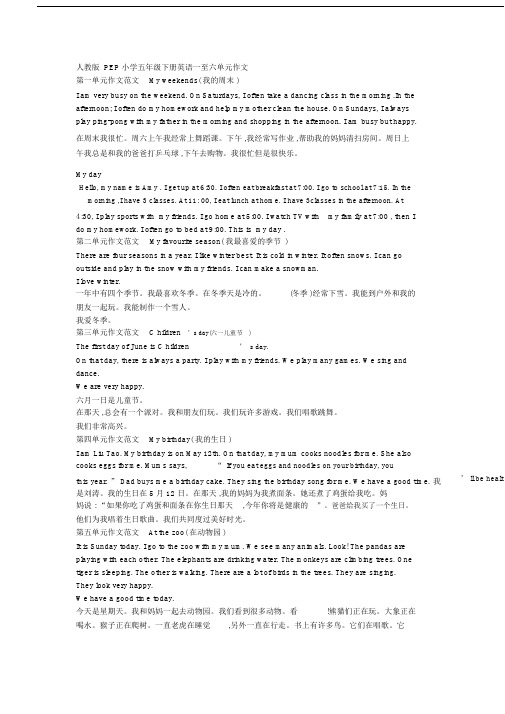
人教版 PEP小学五年级下册英语一至六单元作文第一单元作文范文My weekends( 我的周末 )I am very busy on the weekend. On Saturdays, I often take a dancing class in the morning .In theafternoon; I often do my homework and help my mother clean the house. On Sundays, I alwaysplay ping-pong with my father in the morning and shopping in the afternoon. I am busy but happy.在周末我很忙。
周六上午我经常上舞蹈课。
下午 ,我经常写作业 ,帮助我的妈妈清扫房间。
周日上午我总是和我的爸爸打乒乓球 ,下午去购物。
我很忙但是很快乐。
My dayHello, my name is Amy . I get up at 6:30. I often eat breakfast at 7:00. I go to school at 7:15. In themorning ,I have 3 classes. At 11: 00, I eat lunch at home. I have 3classes in the afternoon. At4:30, I play sports with my friends. I go home at 5:00. I watch TV with my family at 7:00 , then Ido my homework. I often go to bed at 9:00. This is my day .第二单元作文范文My favourite season( 我最喜爱的季节 )There are four seasons in a year. I like winter best. It is cold in winter. It often snows. I can gooutside and play in the snow with my friends. I can make a snowman.I love winter.一年中有四个季节。
(完整版)人教版小学PEP英语五年级下册知识点归纳

人教版小学PEP英语五年级下册知识点归纳PEP五年级英语下册各单元知识点Unit 1 My day一、重点词汇。
1.四会词汇:eat breakfast 吃早饭 have···class 上······课play sports 进行体育运动exercise 活动;运动 domorning exercises做早操eat dinner吃晚饭clean my room 打扫我的房间go shopping 去买东西;购物go for a walk 散步take学习;上(课) dancing跳舞;舞蹈 take a dancing class 上舞蹈课2. 三会词汇:when什么时候after 在(时间)后start 开始usually 通常地;惯常地Spain 西班牙late 晚;迟 a.m. 午前;上午 p.m. 午后;下午why 为什么shop 去买东西;购物work 工作last 上一个的;刚过去的sound 听起来好像also 还;也busy 忙的 need 需要play 戏剧;剧本letter 信live 居住island 岛always 总是;一直cave 山洞;洞穴go swimming 去游泳 win 获胜二、其他日常活动。
get up起床 eat lunch吃午饭 go to bed 上床睡觉wash my face洗脸 wash my clothes 洗我的衣服 watch TV看电视play ping-pong打乒乓球 playthe pipa弹琵琶 go swimming去游泳go running去跑步 do homework 做作业 do kung fu练武术play football踢足球 play basketball打篮球三、频度副词。
always总是,一直(100%) usually通常(80%)often 经常(60%) sometimes(30%)有时四、疑问词。
人教PEP 小学英语 五年级下册 Unit3单词(带音标和例句)
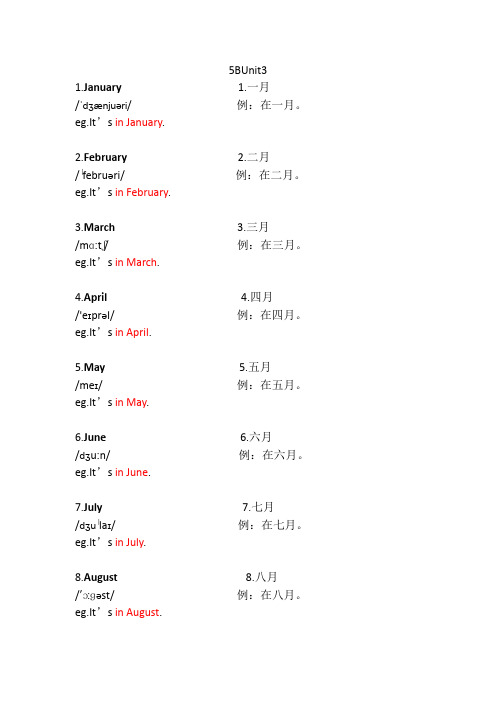
5BUnit31.January 1.一月/ˈdʒænjuəri/ 例:在一月。
eg.It’s in January.2.February 2.二月/ˈfebruəri/ 例:在二月。
eg.It’s in February.3.March 3.三月/mɑ:tʃ/ 例:在三月。
eg.It’s in March.4.April 4.四月/'eɪprəl/ 例:在四月。
eg.It’s in April.5.May 5.五月/meɪ/ 例:在五月。
eg.It’s in May.6.June 6.六月/dʒu:n/ 例:在六月。
eg.It’s in June.7.July7.七月/dʒuˈlaɪ/ 例:在七月。
eg.It’s in July.8.August 8.八月/΄ɔ:ɡəst/ 例:在八月。
eg.It’s in August.9.September 9.九月/sep'tembə(r)/ 例:在九月。
eg.It’s in September.10.October10.十月/ɒk'təubə(r)/ 例:在十月。
eg.It’s in October.11.November11.十一月/nəu'vembə(r)/ 例:在十一月。
eg.It’s in November.12.December 12.十二月/dɪ'sembə(r)/ 例:在十二月。
eg.It’s in December.13.few 13.不多;很少/fju:/ 例:一些eg.a few14.thing 14.事情/θɪŋ/例:我们有一些有趣的事情。
eg.We have a few fun things.15.meet 15.集会;开会/mi:t/ 例:运动会eg.sports meet16.Easter 16.复活节/'i:stə(r)/ 例:我们有一个复活节派对。
eg.We have an Easter party.17.trip 17.旅行/trɪp/ 例:我们有一场学校旅行。
人教PEP版小学五年级下册英语第二单元知识点
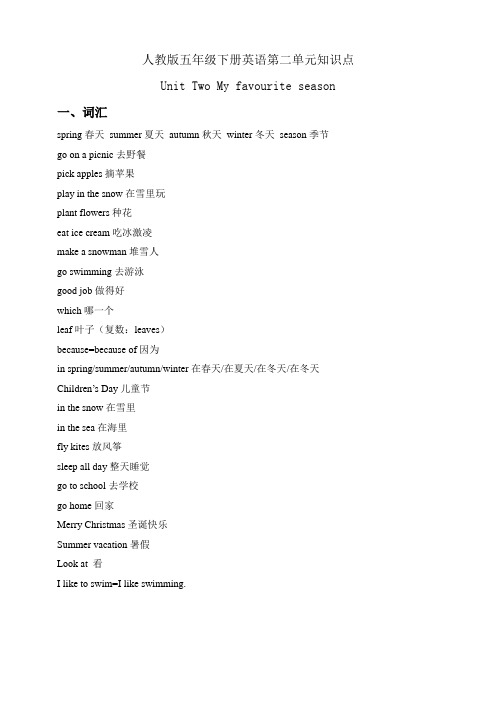
人教版五年级下册英语第二单元知识点Unit Two My favourite season 一、词汇spring春天summer夏天autumn秋天winter冬天season季节go on a picnic去野餐pick apples摘苹果play in the snow在雪里玩plant flowers种花eat ice cream吃冰激凌make a snowman堆雪人go swimming去游泳good job做得好which哪一个leaf叶子(复数:leaves)because=because of因为in spring/summer/autumn/winter在春天/在夏天/在冬天/在冬天Children’s Day儿童节in the snow在雪里in the sea在海里fly kites放风筝sleep all day整天睡觉go to school去学校go home回家Merry Christmas圣诞快乐Summer vacation暑假Look at 看I like to swim=I like swimming.二、语法(一)Which引导的特殊疑问句,就最喜欢的季节是哪一个进行提问Which season do you like best?回答:I like+季节+best.或者I like+季节.或者直接说季节名称。
拓展:What is your favourite season?回答: My favourite season is+季节.季节+is my favourite season.(二)What引导的特殊疑问句,就天气进行提问What is the weather like today?回答:It is......(三)What引导的特殊疑问句,就在某一个季节做某事进行提问What do you often do in +季节?回答:I often+具体的事情.三、重要句子Which season do you like best?I like spring best.Why do you like autumn best?Because the colours are pretty.There are beautiful flowers everywhere.I can sleep all day.How about you?=What bout you?I like summer best.because of Children’s Day.Look at my picture.The weather is good and the colours are beautiful.There is lots of snow.I want to paint a picture ,too.What is your favourite season?My favourite season is spring四、语音(辅音字母组合发音)①br发音为/br/br own li br ary br other um br ella br eakfast②gr发音为/gr/gr een gr apes gr andpa gr ow gr ass gr eat五、拓展①Why和because的用法Why 引导询问原因的特殊疑问句。
PEP人教版小学英语五年级下册Unit5 Part B Read and write

3.Grandpa: Whose rabbits are these?
Robin: These are Yifan’s.
Grandpa: Oh, these are hi rabbits. Robin: Look! The rabbitss are eating their carrots now.
例:Tom is playing with his dog. 汤姆正在和他的狗一起玩耍。
例:The little sheep is drinking water. 那只小羊正在喝水。
例:Tom is sleeping in his room. 汤姆正在他的房间里睡觉。
现在进行时的用法: ①概念:现在进行时是表示现在(说话瞬间)正在进 行或发生的动作。 【例句】I’m doing my ork now. 我现在正在做家庭作业。
I’m looking at the rabbits. I’m eating like a rabbit.
I’m looking at a tiger. I’m running like a tiger.
I’m looking at an elephant. I’m walking like an elephant.
该句是现在进行时的特殊疑问句的问答,问 句结构是:What +be动词+ 主语+动词-ing形式 + 其他?答语结构是:主语+be动词+动词-ing+其他.
例: — What are you doing now? — I’m doing my homework.
我现在正在做家庭作业。
I want to be a bird.我想成为一只鸟。
- 1、下载文档前请自行甄别文档内容的完整性,平台不提供额外的编辑、内容补充、找答案等附加服务。
- 2、"仅部分预览"的文档,不可在线预览部分如存在完整性等问题,可反馈申请退款(可完整预览的文档不适用该条件!)。
- 3、如文档侵犯您的权益,请联系客服反馈,我们会尽快为您处理(人工客服工作时间:9:00-18:30)。
人教版PEP小学英语五年级下册
Unit5 Look at the monkeys
A Let’s learn Let’s talk
一、Teaching aims
1、能够听、说、认读句子:Look at the tiger! It’s jumping ! The rabbit is running .
2、能够听、说、读、写动词短语的ing 形式:flying , jumping , walking , running , swimming
3、能用进行时态进行描述图片内容。
二、Key Points
1、本课时的教学重点是掌握五个动词的ing形式,并用现在进行时进行简单表达。
2、本课时的教学难点是running和swimming的拼写。
三、Teaching steps
1、Free Talk.
1)Review animals.Show some toys of animals.
2、Review actions.
fly, walk, run, jump, swim…
The bird can fly. The rabbit can jump. The fish can swim.
2、Presentation
(1)课件呈现出现动词的变化,由walk 变成walking run 变成running.
(2)呈现课文图,学生讨论几种动物,分别在做什么,出现进行时态的结构。
让学生能在此结构上进行描述图片中的内容。
(3)做课件连线题。
(4)写出动词的ing形式
(5)呈现课件,看对话视频:
A:I see the mother elephant.
B:What is she doing?
A:She is walking.
B:What about the baby elephant? What is it doing?
A:It’s running.
(6)让学生圈出重点词mother elephant ,baby elephant.然后回答问题What is mother elephant doing? What is the baby elephant doing?
(7)Read after video and teacher.
(8)分小组进行朗读。
(9)合作展现。
师生,生生。
3、Practice.
(1)Make a chant.
(2)Writing practice.
A: I see a .
B: What is it doing?
A: It’s .
4 、Development
1)Listen and do.
2)Let students to love the animals.
5、Homework
1)Know more about animals.
给学生一个网址,上去可看到更多关开动物的信息:http:// www. wildaid. Org 2)自制一本动物的画册,并配上英语
附二:看图写话
A: Look at the dog.
B: What is it doing?
A: It is sleeping.
B: How lovely.
A: Look at the .
B: What is it doing?
A: It is .
B: Wow, cool!
A: .
B: What is it doing?
A: .
B: How clever.(聪明)
A: .
B: ?
A:
B: How fast(快).。
